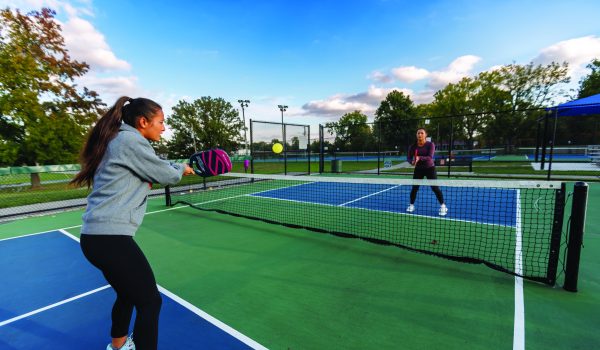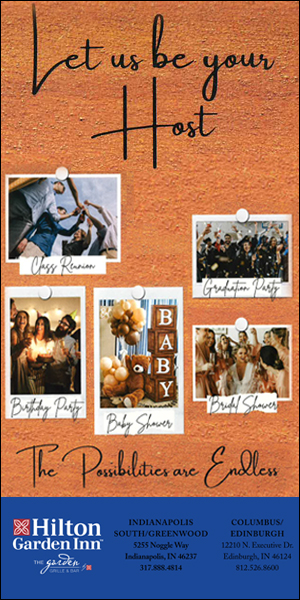
Pickleball brings families, players and community together
By Amanda Stevenson-Holmes // Photography by Tony Vasquez
Even people who claim to have little athletic ability have probably heard of pickleball, which is considered by many to be one of the fastest growing sports in the U.S.
Developed in 1965, pickleball is believed to have originated as a game in a Washington state backyard and created by a group of families who were bored with other activities. However, almost 60 years later, the game is far from boring.
“A friend introduced me to pickleball, and I played once or twice and didn’t really think much about it,” said Lindsay Ems, associate professor of organizational communication and leadership at Butler University and Pickled Paddler founder. “Then, the pandemic hit, and we started to play a lot because it was something we could do safely.”
Pickleball explained
A cross between tennis and ping pong, pickleball is played in doubles format — two players pitted against two other players, on a space about half the size of a tennis court. Each competitor uses a paddle to serve and to hit a ball, like a wiffle ball, across a net. The paddles are larger than ping pong paddles but smaller than tennis rackets. The ball travels slower than on a tennis court and the paddles are much lighter, making the sport more accessible for people who have physical limitations.
“The ping pong players often have an easier transition because it’s almost the same sport. It’s just that you’re standing on the table,” Ems said.
People who play the sport believe it provides them physical, mental and emotional health benefits.
“Pickleball is a thinking sport, so it’s much like chess, except it’s active and social. There’s a lot of strategy to the game, which makes it fun to learn. You never stop learning, advancing and trying to improve,” said Ems, whose father picked up the game to meet people in his new community and lost 30 pounds in the process.
A game for everyone
Pickleball may also help build community relations.
“The best part of pickleball is its social aspect. It’s a party. You play. You’re active. You’re engaging with others. Whereas with tennis, you’re so far away from the other person or players, you can’t really
talk to them,” Ems said. “During pickleball games, you learn what’s going on in people’s lives. It’s a community builder. It’s accessible for parents, grandparents and children.”
Ems incorporated her passion for pickleball into the communication and social responsibility course she teaches at Butler. In the course, students work with organizations that facilitate recreation, specifically in underserved communities. Through the class, students learn how to help improve the accessibility of equitable recreation and expand their understanding of inequality in sport, recreation and leisure, and use communication to improve the health and well-being of communities.
“We have to keep the spirit of accessibility that pickleball originated from as we continue to grow the sport and as we invest more community resources, especially into public leisure infrastructure,” Ems said.
Local pros among us
Jackie and Jade Kawamoto agree that accessibility is key to growing the sport. The sisters are local, pro pickleball players who originally excelled at tennis. In 2004, they moved from Hawaii to Greenwood with their parents, Don and Cindy, and siblings, Lisa and Dane. The two were all-state tennis players for Greenwood Community High School and played together in college at the University of Dayton.
“Our dad started playing and quickly brought us along,” Jackie said.
“What hooked us was that we could play with anybody, so we could play with our parents, or people younger than us or older than us. It didn’t matter. We could all share the court together and play,” Jade added.
The sisters, who are part of the Professional Pickleball Association (Carvana PPA Tour) and Major League Pickleball, often play with their parents, but not at full-tournament strength.
“We definitely have to play down. We can’t blast it at the parents,” Jackie said with a laugh. Jade explained their strategy of pairing each sister with a parent and the goal of simply having fun, which helps keep the whole family engaged and interested in playing.
When the sisters aren’t playing pickleball with their family or competing in a pro pickleball tournament, Jackie is assistant coordinator at Championships and Alliances, and Jade is an assistant director in the eligibility center at the NCAA. Both would love to see pickleball as an NCAA and Olympic sport someday.
Giving back to their community
Jackie and Jade also devote their time to supporting a new pickleball tournament in Greenwood that benefits the Alzheimer’s Association Greater Indiana Chapter. The tournament, called Making Memories Classic, was held at Craig Park last July, and the sisters intend to make it an annual event with co-host Dr. David Mandelbaum.
“We love helping, and it’s a way to get the local pickleball community involved and bring new people into the sport while having a little competitive fun,” Jackie said.
“It was a great way to bring the Southside community together,” Jade added.
Tournament proceeds provide local care and support, as well as fund dementia research around the world. More information about 2024 dates can be found at www.pickleballbrackets.com
Where to get your game on
Public and private pickleball courts, both indoor and outdoor, are becoming easier to find on the southside of Indianapolis.
The city of Greenwood currently offers seven pickleball courts at Craig Park, four at the Greenwood Fieldhouse and four at the Greenwood Community Center. Plans are underway to build a 16-court pickleball complex at Freedom Park near Freedom Springs Aquatic Park on the west side of the city, bringing the total number of public pickleball courts to 24 in Greenwood. With 16 courts at Freedom Park, the city would also be eligible to host pickleball tournaments, which require 16 courts. More information can be found at www.greenwood.in.gov
Franklin is also in the pickleball game with its eight Youngs Creek Park courts, installed in 2022. Half of the courts tend to be reserved for competitive players, while the other half are reserved for more casual or social players. Explore more at www.franklin.in.gov
The Baxter YMCA on South Shelby Street offers an indoor court for members who bring their own paddles and balls. Learn more at www.indymca.org/baxter
Dropshot Pickleball in Franklin on Commerce Park Drive also offers indoor court options with standard and VIP memberships. Discover more by calling (317) 426-1566 or emailing [email protected]


